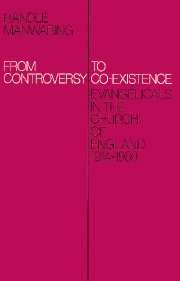Book contents
- Frontmatter
- Contents
- Acknowledgements
- Preface
- 1 Into battle
- 2 The defensive years
- 3 Through the Waste Land
- 4 Continuing nadir
- 5 The turning tide
- 6 Towards the conversion of many
- 7 Flood-tide of Evangelism
- 8 Anatomy of Evangelicalism
- 9 The Fundamentalist issue
- 10 The hard facts of Evangelicals and unity
- 11 The Honest to God debate
- 12 Liturgical debates
- 13 Charismatic differences
- 14 Keele – a watershed
- 15 Evangelical identity – a problem
- Notes
- Index
9 - The Fundamentalist issue
Published online by Cambridge University Press: 18 September 2009
- Frontmatter
- Contents
- Acknowledgements
- Preface
- 1 Into battle
- 2 The defensive years
- 3 Through the Waste Land
- 4 Continuing nadir
- 5 The turning tide
- 6 Towards the conversion of many
- 7 Flood-tide of Evangelism
- 8 Anatomy of Evangelicalism
- 9 The Fundamentalist issue
- 10 The hard facts of Evangelicals and unity
- 11 The Honest to God debate
- 12 Liturgical debates
- 13 Charismatic differences
- 14 Keele – a watershed
- 15 Evangelical identity – a problem
- Notes
- Index
Summary
Among the opponents of Evangelicals are those who insist on giving them the label ‘Fundamentalist’. In some quarters it has become a kind of theological swear-word and, probably, the issues of Fundamentalism in general reached boiling point soon after the Billy Graham Crusades in 1954 and 1955. In a way, it was natural that a reaction should set in and there were those only too eager to explain away the results of Evangelism on a big scale and to point up its dangers.
However, there can be little doubt that the work of Billy Graham had lasting effects throughout Anglicanism, its benefits by far outweighing any attendant disadvantages. For one thing, very many men who were deeply moved at Harringay, Wembley and elsewhere went on to ordination. Autobiographical reference can be eloquent, for example, Lord Home:
Another who, many years later, influenced my thinking, was Billy Graham, the American evangelist. Like Dr Alington, he spread the joy and hope in Christianity. I cannot say that I was particularly attracted by the spectacular stage-management of his Christian circus, but he got results.
I asked Dr Ramsey, the Archbishop of Canterbury, how he felt about the techniques employed, and he replied that all he could say was that after each of Dr Graham's campaigns in Britain there was a significant number of individuals who joined the Anglican ministry.
- Type
- Chapter
- Information
- From Controversy to Co-ExistenceEvangelicals in the Church of England 1914–1980, pp. 112 - 122Publisher: Cambridge University PressPrint publication year: 1985



